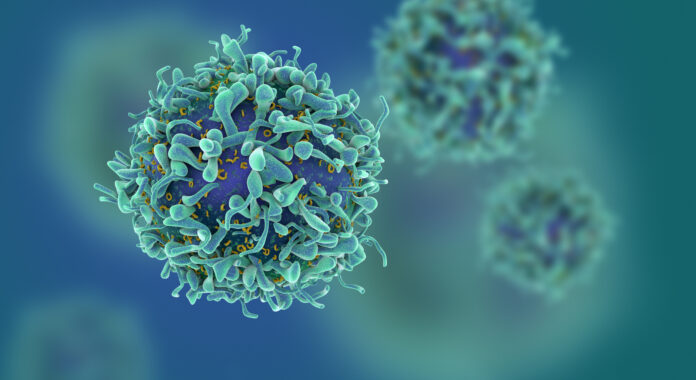
Researchers at the Johns Hopkins University School of Medicine and the Johns Hopkins Kimmel Cancer Center have identified a protein called Meteorin-like (METRNL) that depletes energy from T cells, severely limiting their ability to fight cancer.
The findings, published in Immunity suggest that blocking METRNL’s effects on tumor-infiltrating T cells could help restore their energy and enhance their tumor-fighting capabilities.
METRNL, previously known for its role in generating heat in cold or exercising animals by affecting the mitochondria in fat cells, had not been recognized as active in cancer or T cells until now. “Others have shown that metabolic dysfunction limits T cells’ ability to fight cancer, but we are among the first to describe a discrete signaling pathway that causes that to happen,” said lead study author Christopher Jackson, MD, an assistant professor of neurosurgery at Johns Hopkins.
The research reveals that when T cells are chronically stimulated while attempting to eliminate a tumor, they secrete METRNL. This protein interacts with the mitochondria, disrupting the electron transport chain, a process essential for energy production. As a result, T cells are unable to meet their energy demands and cease their efforts to kill cancer cells, allowing tumors to grow and spread.
“Most of the previous work has looked at how the lack of specific nutrients in tumors limits a T cell’s ability to function. The problem is this is difficult to modify because it’s hard to get the right nutrients into a tumor and direct them to T cells. We potentially can do much better by targeting a signaling pathway because we can block it or turn it on or off,” Jackson explained.
In laboratory investigations, the researchers analyzed T cells from the tumor tissue and blood of patients with untreated brain tumors (glioblastomas), prostate cancer, bladder cancer, and renal cell/kidney cancer. RNA sequencing identified METRNL as the most highly expressed gene responsible for T cell dysfunction in tumors. Chronic stimulation was found to be the reason T cells secrete METRNL, a state common in cancer where the immune system is perpetually activated.
Further study determined that METRNL acts directly on the mitochondria, decoupling the electron transport chain. As T cells lose energy, they attempt to use glucose as an alternative source. However, the tumor environment’s low glucose levels cause the T cells to continue failing and eventually die, enabling tumor growth. Deleting METRNL in models of various cancers universally delayed tumor growth.
The researchers also discovered that METRNL activation is regulated by a family of transcription factors called E2F and depends on signaling by the receptor PPAR delta. Modulating these factors can block METRNL’s effects.
The next steps involve determining how these findings can be applied to patient care. Jackson and his team are exploring different methods to target the METRNL-E2F-PPAR delta pathway or to combine this targeted treatment with other immunotherapies. “We think that one of the reasons that some current immunotherapies fail is they require more energy from immune cells that already are functioning at decreased capacity,” Jackson said.
“Blocking the pathway may allow these immunotherapies that maybe have not been effective in the past to be more effective because there will be enough fuel for the T cells to meet that increased demand.”





